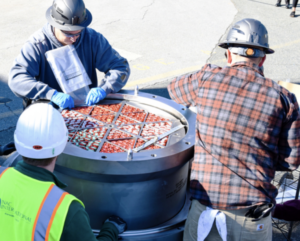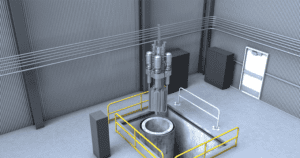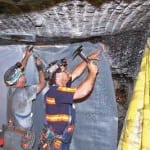The U.S. Mine Safety and Health Administration (MSHA) announced last Wednesday that it has determined that Massey Energy officials kept two sets of safety records for the Upper Big Branch Mine (UBB) in Raleigh County, W.Va., site of a deadly explosion a year ago. Additional details, including evidence that miners faced intimidation that prompted them to ignore safety hazards, point to the conclusion that the accident last spring was preventable.
The April 5, 2010, explosion killed 29 miners and injured two more. The MSHA investigation shows that the explosion at the UBB mine was started by a limited amount of methane that was likely ignited by the shearer and that ignition was not prevented because there were missing and faulty water sprays as well as other contributing factors. An MSHA briefing last week noted that "This explosion could and should have been prevented by the mine operator."
Kevin Stricklin is assistant administrator of coal at the U.S. Mine Safety and Health Administration. Bloomberg reported that Stricklin said the MSHA’s investigation of the April 2010 blast "found duplicate books on daily mine operations. On several occasions in the months before the blast, the books didn’t match, he said. One set told inspectors there were no serious issues while internal reports revealed many hazards, he said."
The MSHA investigation has involved, among other things, more than 84,000 pages of documents, 23,405 photos, and 1,060 pieces of physical evidence. In addition to training deficiencies, the federal safety body found that mine workers were given "illegal advance notice" of inspections: "Security guards radioed the mine office when mine inspectors arrived," and "Dispatchers relayed the information underground and tracked the movements of mine inspectors." This gave operators time to "correct non-compliant conditions and/or shut-down production" and increase airflows in the area to be inspected.
Despite these tactics, which limited the effectiveness of inspections, MSHA "issued more 104(d) orders at UBB than in any other coal mine in the year prior to the accident" the presentation notes.
Additionally, miners were routinely intimidated into ignoring safety hazards. The presentation notes that "UBB upper management threatened to fire first line management for not meeting production goals." Specifically, "Safety hazards such as insufficient air were not acceptable excuses for not running coal," and "A section foreman was fired for delaying production for about an hour to fix ventilation problems." An especially telling fact was that miners at UBB "submitted only one underground hazard complaint since 2006."
While noting that the investigation is ongoing, Joseph A. Main, assistant secretary of labor for mine safety and health, said in a press release that "MSHA also has pledged to cooperate with the U.S. attorney and the FBI as they bring to justice those who may have broken the law."
The New York Times noted that "Two people have already been indicted in the case this spring, according to Melvin Smith, a spokesman for the United States attorney’s office for the Southern District of West Virginia: a foreman, accused of lying on a document and to federal officials, and the former chief of security, accused of lying and concealing documents."
According to the Times, "Massey managers, including the former chief executive, Don Blankenship, have not been charged, including 18 executives who refused to be interviewed for the federal investigation, invoking their Fifth Amendment rights."
Massey Energy agreed in January to be acquired by Alpha Natural Resources Inc. The merger, now complete, has created what Alpha calls "the world’s third-largest metallurgical coal supplier."
Sources: MSHA, The New York Times, Bloomberg, Alpha Natural Resources









